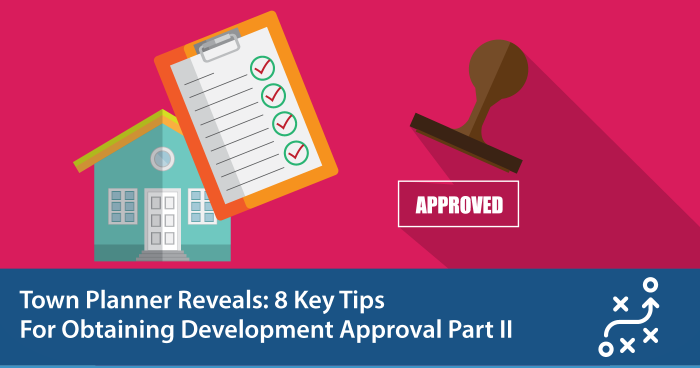Revealed: 8 Key Tips For Obtaining Development Approval (Part 2)

Today we are continuing the series published last week dedicated to saving subdividers from possible property disasters.
As I explained last week, this post should be seen as an important “refresher course” for those of you readers who’ve been around the block once or twice – and as a potential lifesaver for those who haven’t pulled the trigger on their first deal.
So what is this all about?
Well, as you probably know, there are A LOT OF HOOPS to jump through in a property subdivision. Many are confusing, many are time-consuming, and all of them are required in order to complete a successful, profitable subdivision.
And the most significant, most confusing, most critical hoop of all is…
I'm pulling back the curtain, revealing my best kept Deal Finding Secrets!
- My Secret Search Strategies: Unlock hidden cracker deals no one else knows about
- Stop wasting hours on research: Simple setup automatically hunts down hot deals for you!
- How to use Australia’s top research tool anytime to turning boring research into an exciting treasure hunt
- Bonus: Free Research Tool Credits Included!
🎯 Don’t miss this!
…the one that’s the difference between developing a profitable subdivision and being stuck with a block of dirt that doesn’t earn you a cent… is…
Obtaining the coveted development approval from Council!
OK, so in Part 1 of (published last week) we discussed how to:
- Hire a qualified town planner
- Be aware of the risks
- Respect your town planner
- Learn from your town planner
And today I bring you more tips for guaranteeing your next subdivision is a “money-in-the-bank” one:
5. Use other educational resources

Although your town planner is a great source of information, there are several other places where property investors can turn for free education.
After completing a few basic checks, calling Council regarding a potential subdivision project is another step that property investors can take on their own.
Making a simple phone call to a knowledgeable person doesn’t cost a thing and can help you to reduce the risk of the project.
When speaking to Council, property investors shouldn’t be afraid to keep someone on the phone until they get all their questions answered.
In addition to asking if the property can be subdivided, property investors should also ask the Council representative to show them where they can find the relevant information.
If you are still happy with the results of your searches and your conversation with Council, your next step should be to contact your town planner.
6. Confirm the results of your research

Although Council and other sources can provide lots of free information for property investors, be mindful to double-check with your town planner about any information they receive—because it may not be correct.
Council often gives black-and-white answers, but your town planner should be aware of any grey areas.
We’ve heard of unfortunate situations where Council incorrectly and informally told a client that they could go ahead with a subdivision—and Council ended up being wrong.
In one case, the property investor was already locked into an unconditional contract when he found out that he couldn’t subdivide without getting permission from adjacent property owners to dig up their land and place stormwater and sewer lines.
To make matters worse, he paid a premium for the land because he was incorrectly told that he could subdivide.
In this situation, the only person who made out was the property seller.
It’s easy to walk away from a potential deal, but it’s not so easy to spend a year on a project only to break even or lose money.
In this case, a two-minute phone call to a town planner could have saved the property investor a bundle of money.
7. Understand the costs

Most property investors underestimate the costs of a subdivision project.
A town planner will typically charge around $2,500 for their town planning services on a standard “one-lot-into-two” subdivision.
However, many property investors forget that the services of a civil engineer and a surveyor will also be required—or, they sometimes forego hiring a civil engineer to save money, he said.
Civil engineering can be a big variable in the total cost of the project, but property investors can be in for some expensive surprises if they decide to proceed without civil engineering services.
Property investors should also be mindful of costs related to infrastructure and earthworks.
Because subdivision costs come from many different places, it can be difficult to pull all the costs together to get a final number. Speak with as many knowledgeable people as possible to find out how much everything will cost.
The most sophisticated property investors also ask questions to determine the reasoning and logic behind every cost estimate they receive.
Beware of contractors who can’t explain things in layman’s terms—they may lack an understanding of the project or could be trying to cheat you, he said.
If the logic behind the estimate sounds good to you, it can help you to be more certain and allows you to ‘de-risk’, don’t be afraid to challenge members of your team.”
8. Be prepared to solve problems

The most successful property investors are those who are willing to solve problems that other people won’t.
Those who are really keen say, ‘Help me understand that.’ The ones who have more of an appetite ask how we can make it work.”
Sophisticated investors, look at sites with an open mind and try to find twists in deals that will allow them to uncover gold. Assembling the best possible team can help you to see obstacles as opportunities.
If you are looking to develop a profitable subdivision, a solution-focused, qualified town planner can help you to maximise your profits and avoid costly mistakes that can set you back years and result in nothing more than a big, red council stamp saying “declined.”
Check out the Ultimate Property Hub and access the Subdivision Masterclass, which includes tips and tools to help you make your subdivision project a success.
Looking for proven ways to create profits in the current market?
You'll find over 200 step-by-step case project studies, our renown Master Classes and Property Crash Courses… and heaps more!
Try the Ultimate Property Hub now –– it's free!


Where there is life there is hope! Thanks Matt, working on my big picture puzzle pieces, subdivision is not only how to get their it’s part of my legacy plan.
Good stuff Merryl… you’ll inspire many. Cheers, Matt
I appreciate that this post mentioned it is important to ensure the validity of our research when planning a town. It makes sense to check the validity as it will impact the whole planning procedure. If I know anyone who can benefit from this information, I will share it with them as this is crucial.